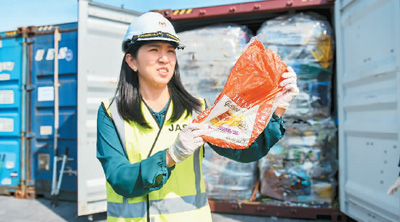


(Photo/Xiinhua)
Indonesia's customs office is set to send back eight containers of waste paper from Australia after they were found to be contaminated with toxic materials, the Jakarta Post reported on July 9.
Just one week earlier, Indonesia returned 49 containers of waste to developed countries, including France.
For years, developed countries including the US, the UK, Germany, Canada, Australia and Japan have shipped an astonishing amount of garbage to developing Asian countries including China, Malaysia and the Philippines.
Starting from January 2018, China stopped receiving foreign garbage, banning 24 types of solid waste. Ever since, garbage recycling enterprises in Europe and the US have diverted their focus to other parts of Asia, with Thailand, Malaysia and Indonesia becoming major recipients.
For instance, Germany exported 600 tons of waste to Indonesia in 2017, while the figure exploded to 49,500 tons in the first 10 months of last year. The amount of rubbish being shipped to Malaysia by Germany also surged to 456,000 tons in the first half of 2018, from just 168,500 the year before.
The rise in imported waste has had adverse effects on the environment and people of recipient countries. Under such colossal pressure, Southeast Asian countries had to roll out relevant measures and regulations to restrict the import of waste.
This June, the Philippines returned 69 containers of foreign waste to Canada, while Malaysia also sent 450 tons of garbage back to Australia, Canada, Japan and the US in May.
Thailand declared that it would ban imports of foreign waste before 2021, and Vietnam said it would also stop issuing new licenses for the importation of waste.
"Because of the gaps in economy, technology and legal construction between developing and developed economies, the garbage producers in developed countries rely on this irresponsible garbage disposal to reduce costs as much as possible," said Tan Quanyin, an assistant research fellow at the School of Environment, Tsinghua University.
"However, these producers are not able to conduct effective monitoring on the trade of waste in developing countries, which has led to developing countries becoming waste yards," Tan added, saying this is a major issue being faced by China and Southeast Asian countries.
According to World Bank statistics, the population of developed countries only accounts for 16 percent of the world's total, but they produce 34 percent of the world's garbage. Though shipping the waste to developing countries creates economic benefits, such an approach is causing enormous problems.
The World Bank said that the volume of solid waste produced worldwide is expected to hit 3.4 billion tons by 2050. With more and more Southeast Asian countries refusing to accept imported waste, the question is, how will developed countries deal with their garbage?
Some analysts believe that Africa might be the next target, but this would just be another irresponsible decision. These countries should stop trying to pass off this problem and find a solution at the source.
"Foreign waste has long been an issue of both development and global governance that concerns many countries. Awareness needs to be raised, and related international laws need to be passed to carry out comprehensive treatment," said Xu Liping, a researcher with the National Institute of International Strategy under the Chinese Academy of Social Sciences.
Xu believes that developed countries, as the major producers of most foreign waste, should take the responsibility and dispose of the garbage on their own territory.
He noted that developing countries should also enhance relevant legislation and law enforcement to further halt the import channels of foreign waste.
 Fire brigade in Shanghai holds group wedding
Fire brigade in Shanghai holds group wedding Tourists enjoy ice sculptures in Datan Town, north China
Tourists enjoy ice sculptures in Datan Town, north China Sunset scenery of Dayan Pagoda in Xi'an
Sunset scenery of Dayan Pagoda in Xi'an Tourists have fun at scenic spot in Nanlong Town, NW China
Tourists have fun at scenic spot in Nanlong Town, NW China Harbin attracts tourists by making best use of ice in winter
Harbin attracts tourists by making best use of ice in winter In pics: FIS Alpine Ski Women's World Cup Slalom
In pics: FIS Alpine Ski Women's World Cup Slalom Black-necked cranes rest at reservoir in Lhunzhub County, Lhasa
Black-necked cranes rest at reservoir in Lhunzhub County, Lhasa China's FAST telescope will be available to foreign scientists in April
China's FAST telescope will be available to foreign scientists in April "She power" plays indispensable role in poverty alleviation
"She power" plays indispensable role in poverty alleviation Top 10 world news events of People's Daily in 2020
Top 10 world news events of People's Daily in 2020 Top 10 China news events of People's Daily in 2020
Top 10 China news events of People's Daily in 2020 Top 10 media buzzwords of 2020
Top 10 media buzzwords of 2020 Year-ender:10 major tourism stories of 2020
Year-ender:10 major tourism stories of 2020 No interference in Venezuelan issues
No interference in Venezuelan issues
 Biz prepares for trade spat
Biz prepares for trade spat
 Broadcasting Continent
Broadcasting Continent Australia wins Chinese CEOs as US loses
Australia wins Chinese CEOs as US loses